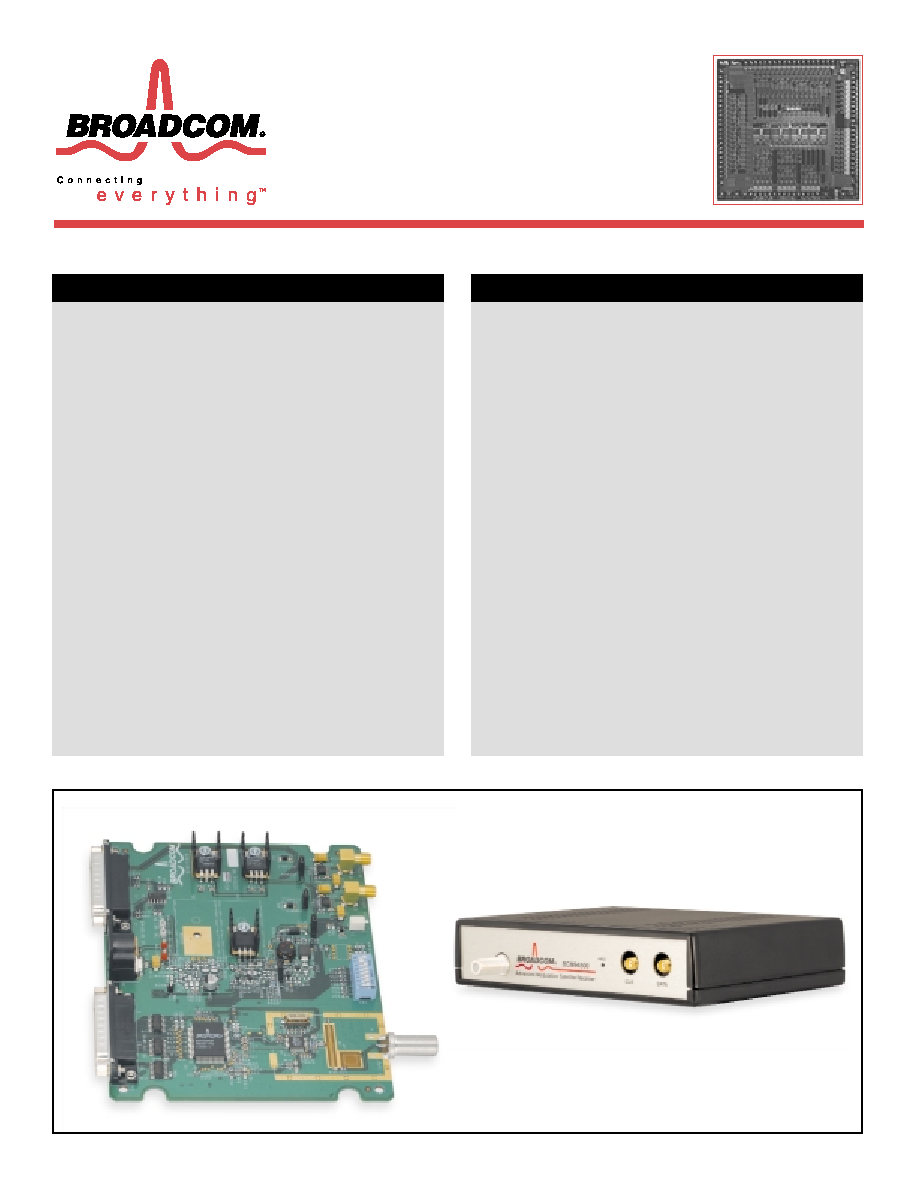
B C M 9 4 5 0 0 F E A T U R E S
BCM94500 Advanced Modulation Satellite Receiver Evaluation System
∑
Demonstrates the high performance of the BCM4500
advanced modulation satellite receiver, which supports
QPSK, 8PSK and 16 QAM with a turbo code FEC.
∑
Supports legacy modes based on DIRECTV
Æ
and
DVB-S QPSK standards.
∑
High-performance direct conversion BCM3440
satellite tuner exceeds performance of typical single-
chip satellite tuners for increased system performance.
∑
Highly integrated BCM3440 and BCM4500 devices
enable low-cost implementation with minimal external
components.
∑
Host software uses the BCM4500 high-level
application program interface (API) implemented in
the on-chip microcontroller contained in the
BCM4500.
∑
BCM3440 also controlled by the host through the
BCM4500 API.
∑
Highly integrated Windows
Æ
software enables
evaluation of all advanced modulation/turbo modes, as
well as legacy DVB and DIRECTV modes.
∑
Easy interface to PC via parallel port and I
2
C
connector on BCM94500.
∑
Interface to BCM4500 Integrated DiSEqC
TM
2.0 for
two-way communication with external hardware.
S U M M A R Y O F B E N E F I T S
ADVANCED MODULATION SATELLITE RECEIVER EVALUATION SYSTEM
PRODUCT
Brief
B C M 9 4 5 0 0
∑
Evaluation system based on BCM3440 direct
conversion CMOS satellite tuner and BCM4500
advanced modulation satellite receiver
∑
Supports full satellite input range (950≠2150 MHz)
∑
Standard MPEG-2 output in DIRECTV
Æ
or DVB
format
∑
Standard DVB-SPI MPEG output interface: 25-pin
D connector with LVDS line drivers
∑
Interfaces to BCM97031 HDTV decoder/graphics
evaluation system
∑
I
2
C bus interface to PC parallel port for system control
∑
Internal BERT and external BERT interface
∑
DiSEqC
TM
(Digital Satellite Equipment Control)
2.0 2-way interface
∑
Complete reference design includes
∑ Schematic drawings and Gerber files
∑ Bill of materials (BOM)
∑ Data sheet
∑ Software source code
∑ User manual
∑
Compatible with Windows
Æ
95, 98, 2000 or NT host PC
operating systems

The BCM94500 advanced modulation satellite receiver
evaluation system is intended for use by satellite systems
engineers for the evaluation of the high performance offered by
the BCM4500 advanced modulation satellite receiver with
turbo code FEC. It is also intended for use by hardware
designers and software developers to reduce product design and
development time.
This evaluation platform provides the ideal environment for
systems engineers to explore the emerging technology enabled
by turbo code FECs and the unparalleled performance offered
by the BCM4500. The simplified user interface gives engineers
easy access to various system parameters, allowing them to
select optimal settings for the BCM4500 to match the link
budget requirements. Hardware engineers and software
developers can use the BCM94500 as a baseline for the final
product architecture and also use it as a test and measurement
device to verify their final product performance.
The BCM94500 supports QPSK, 8PSK and 16 QAM operation
with turbo code FEC over a range of coding and symbol rates.
The system also supports DVB-S and DIRECTV
Æ
modes for
legacy system compatibility testing.
The BCM94500 contains the BCM3440 direct conversion
CMOS satellite tuner, which supports the full 950≠2150 MHz
operating range. Baseband IQ outputs are connected directly to
the BCM4500 receiver. All tuner AGC loops are controlled by
the BCM4500. The BCM4500 process the I/Q baseband signal
through a variable rate advanced modulation receiver and can
use either the turbo code FEC or legacy
DVB-S/
DIRECTV FEC. The MPEG-2, DIRECTV- or
DVB-compliant output is available on a 25-pin connector,
driven by line drivers for connection to external test equipment
or for interfacing to the BCM97031 HDTV video/graphics
subsystem for decoding and display. Additional on-board
components are provided as an interface between the
BCM4500 DiSEqC
TM
controller and external devices, such as
multiple switches.
The BCM94500 is delivered with Windows
Æ
software for easy
installation and testing. The host software communicates with
the BCM94500 via I
2
C protocol via the PC parallel port. The
host software contains several screens for chip configuration,
constellation monitoring, and performance monitoring including
SNR, block error calculations and other FEC performance
parameters. Testing is simplified by having the option to use
other external BERTs or the BCM4500 on-chip BERT.
A detailed user manual is provided that describes the host
software interface as well as the operation of the BCM4500
API for embedded host software development. All acquisition
scripts and monitoring calculations are performed in the
BCM4500 internal microcontroller and are transparent to the
host. The BCM94500 package is delivered with the user
manual, schematic drawings, and a bill of materials. PCB
Gerber files are also available.
B C M 9 4 5 0 0 O V E R V I E W
RA_I
RA_Q
A/D
A/D
7
7
Phase/
Frequency
Recovery
Variable
Rate
Demod
Acquisition/Tracking Loops
and Clock Generation
AGC_CTRL
Nyquist
= 0.20, 0.35
Nyquist
= 0.20, 0.35
12-tap
FFE
Block
Header
Processor
Iterative
Decoder
Outer
RS
Decoder
t=10
M
U
X
Viterbi
Decoder
Sync &
Deinter-
leaver
RS
Decoder
Acquisition
Microcontroller
MBus/SPI
Interface
DATA[7:0]
CLK
VALID
SYNC
ERR
MICRO[4:0]
DiSEqC 2.0
DISEQC
BCM4500 Block Diagram
Phone: 949-450-8700
FAX: 949-450-8710
Email: info@broadcom.com
Web: www.broadcom.com
Broadcom
Æ
, the pulse logo
Æ
and Connecting Everything
TM
are trademarks of Broadcom Corporation and/or its
subsidiaries in the United States and certain other countries. DIRECTV
Æ
is a registered trademark of DIRECTV, INC.,
a unit of Hughes Electronics Corporation. Windows
Æ
is a trademark of Microsoft Corporation.
DiSEqC
TM
is a trademark of EUTELSAT. All other trademarks are the property of their respective owners.
BROADCOM CORPORATION
16215 Alton Parkway, P.O. Box 57013
Irvine, California 92619-7013
© 2002 by BROADCOM CORPORATION. All rights reserved.
94500-PB02-R-4.30.02

